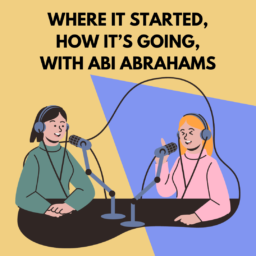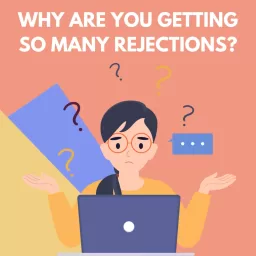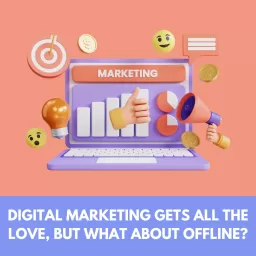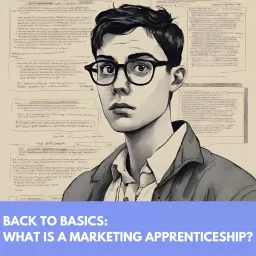Let me guess
You graduated from university starry-eyed into the world of work. Like everyone else, you started your job search, applying for all those awesome-looking graduate schemes and roles that you held ideal to your three to five-year plan. Your first month went well. You applied for loads of jobs and got a couple of callbacks from recruiters and maybe landed yourself some interviews. If you’re one of the lucky few and you landed that job then congratulations. However, for those that didn’t you carried on applying over the next couple of months. The callbacks decreased and those that you did get put forward to didn’t come to fruition. Now, your search has expanded into other areas. Areas you hadn’t previously considered. Just because, well, you need a job to pay the bills.
Don’t worry. You’re not alone. This is a sad state of affairs for thousands of others across the country. Your degree has prepared you for elements of a future career, but not for the fierce competitive nature every year when hundreds of thousands of individuals graduate and hit the job market en masse.
The current situation
The graph below is a simple visual representation of the job market vs the quantity of graduates each year. Don’t just take my word for it, take Bloomberg’s.
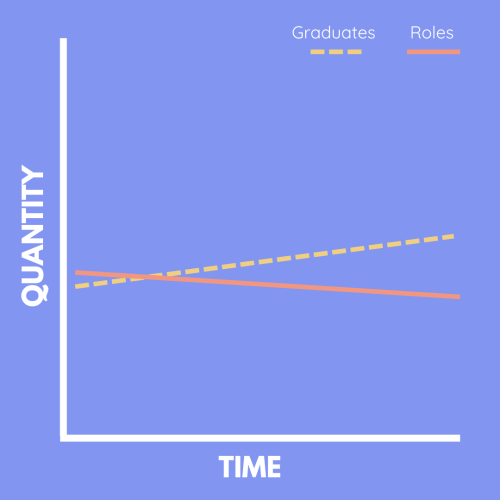
And, I hate to say it, but over time, this will continue to get worse. Having worked in this sector for a number of years, we’ve seen all of the following:
- More and more individuals graduating each year;
- Fierce competition within the market;
- More people doing masters to try and get ahead of the competition;
- More people accruing further debt to enrol on additional training and courses;
- More people ultimately still not really knowing what they want to do;
- A continued collective sigh from a market of candidates struggling to find meaningful work.
However, this article isn’t all doom and gloom. We’re here today to discuss apprenticeships, and specifically, marketing apprenticeships, and how they could be the path into that meaningful career you’re looking for.
Why apprenticeships can help
Over the last five years, I’ve seen more and more graduates using apprenticeships as a vehicle to start alternative career paths. As I mentioned above, sometimes, you just need to start plan B if plan A doesn’t work. Ultimately, you don’t have to do anything forever.
Apprenticeships are a great tool for graduates because they combine all of the things graduates are usually looking for, IE:
- A meaningful job with decent pay;
- A way to potentially utilise their studies holistically;
- To continue studying and learning new skills;
- A shorter-term time investment, typically 13 – 15 months;
- A way of continuing training for zero financial investment;
- A foot into an industry or meaningful career.
If any of the above sounds intriguing then carry on reading.
The psychological benefit
From an employer perspective, apprenticeships are a great way of bringing junior talent into their businesses, training and developing them and building loyalty with those individuals. Another more sub-conscious benefit of apprenticeships for employers is the fact that applicants of apprenticeships are actively acknowledging and committing to the associated durations. This is a positive for employers as they understand that you’re not only looking to gain the experience but you’re more committed to developing, learning, and proactively bringing those skills into their workplace. This means that oftentimes employers are very receptive to the idea of hiring graduates into apprenticeship positions as they know they’ll be getting a more mature and applied individual who will pick up skills easily and may require less hand-holding over a college or school leaver.
Synergistic degrees
“But, I don’t have a degree or background in marketing” I hear you say. This is a common argument I hear from candidates. But, in reality, dozens of degrees lend themselves to elements or the skills required for marketing. Marketing as a subject can be incredibly broad, and at the same time, incredibly niche. I know people from all educational backgrounds who’ve made their way into fruitful marketing careers including:
- English;
- Journalism;
- Sociology;
- Psychology;
- Data and statistics;
- Anthropology;
- Politics;
- Graphic design;
- Web design;
- Animation;
- Media studies;
- And the list goes on…
Ultimately, because marketing can be so diverse, there are dozens of roads into it. Each of the above subjects have complementary skills and knowledge which can help someone become an effective marketer. Whether it’s the drive to understand what makes people tick, the ability to design and create appealing assets, or the collection, review, and presentation of data, they can all be beneficial.
“Apprenticeships are a step backwards”
I’ve heard this from time to time. But, are they though? If you’re looking to break into an industry or start a career, learn practical skills, get some experience on your CV, and get paid to work and study, does it still sound like a backward step? Probably not. I recently spoke with some of my old learners, some of whom came from degrees, like Eelinn, a journalism graduate who completed her digital marketing apprenticeship and is now a Marketing Manager looking to build her team. For many people, their apprenticeship is simply the springboard and stepping stone for their future career trajectory. A short-term investment can lead to much greater things. Think of apprenticeships as the graduate scheme for SMEs as opposed to multi-nationals.
How the process works
The process of starting an apprenticeship is relatively straightforward. It’s like working with a recruiter and a teacher at the same time. Ultimately, because training providers have more skin in the game, they tend to work harder to get you into work. The process goes something like so:
- You sign up with a training provider or apply for one of their roles;
- You have a chat with their team and they put your CV out to prospective employers;
- They arrange interviews for you to attend;
- Fingers crossed, you land yourself a role;
- You start work and work with your training provider to study toward your qualification;
- You complete your qualification and get a certificate, plus all of the other benefits mentioned previously.
Our programmes
We currently offer three marketing programmes. However, we plan on adding to this as time goes by. These include:
- Multi-Channel Marketer – A great apprenticeship for those looking to break into the industry and who want to learn from the ground up about online and offline marketing;
- Marketing Executive – A slightly more advanced programme which is used by those with a little experience or that’ve already studied some modules related to marketing;
- Market Research Executive – A programme for those who’re more interested in what makes people tick. It covers all the ins and outs of what it takes to be an effective Market Researcher.
To add some extra magic to most of our programmes, we also embed level 3 or 4 CIMs into the apprenticeships at no extra cost to you as an apprentice. This means that you get to save approximately £1,500 and you study toward this additional qualification whilst you work.
Off-the-job training
On that note, another huge benefit of apprenticeships is OTJ (Off-the-job training). This is something that is severely undersold within the industry. This little beauty is something that you’ll struggle to find in any other job. OTJ is a mandatory requirement that any employer who takes on an apprentice has to provide a minimum of 6 hours per week for their apprentice to learn and develop within their role. This means that each week you’ll be allotted time to work on your CPD during work time. Wait, it gets better, you also get paid to do so. That works out to about 288 hours per year. What other jobs are you going to do where you’re paid for 288 hours of work to learn new skills during work time… Very few!
Where do you go from here?
So, there you have it, my 2 cents on why apprenticeships could be the life vessel you need as a graduate. We come at this subject purely from the perspective of marketing apprenticeships. However, there are something like 1200 different apprenticeship standards out there. It’s just a case of you considering your options and exploring whether an apprenticeship could open the right doors for you.
Interested in signing up for a marketing apprenticeship?
Simply fill in the form on this page and we’ll get in touch if you’re a good fit. We always try to get back to everyone but sometimes this can take a while so please bear with us. Just as a reminder, here are some of the benefits of doing an apprenticeship with us:
- Gaining practical hands-on marketing experience & skills;
- Getting a better perspective on where you want to go in life;
- Earning a salary while you study;
- You’ll have access to mentorship and guidance along the way;
- Apprenticeships lead to better career opportunities;
- Gain industry-recognised qualifications for free.


